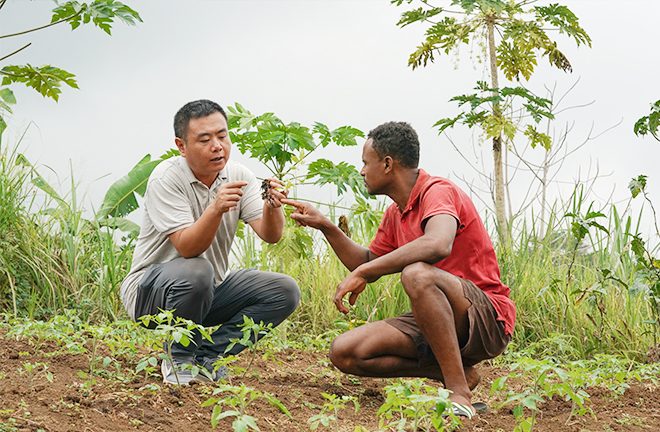China-Africa ties continue to deepen

A Chinese expert instructs an African farmer to cultivate peppers at a village in Sao Tome and Principe. Photo: XINHUA
In 2023, amidst ongoing geopolitical tensions such as the Russia-Ukraine conflict and the Palestine-Israel conflict, the relationship between China and Africa remained stable and continued to deepen. Guided by the principles of sincerity, real results, amity, and good faith, as outlined by Chinese President Xi Jinping, the cooperation between the two sides yielded significant achievements across various sectors. In a recent interview with CSST, Lauren Johnston, an associate professor from the China Studies Centre at the University of Sydney in Australia, who has been following China-Africa ties for two decades, shared her insights into the development of the relationship and bilateral cooperation in 2023.
According to Johnston, the relations between China and the African continent have focused on building momentum and deepening ties.
In Johnston’s view, China’s relationship with Africa is incredibly diverse across countries, people-to-people ties, the composition of economic ties, and around the level of development of particular African countries, as well as its own political system. “Overall, China is a major foreign investor in Africa, and has been the continent’s largest trade partner every year since 2009,” she noted.
During the interview, Johnston cited the third China-Africa Economic and Trade Expo as a key milestone of bilateral relations. Hosted by Changsha in central China’s Hunan Province in mid-2023, the expo reportedly recorded some 100,000 visitors and resulted in roughly 120 project agreements worth a total of $10.3 billion.
Johnston said that the expo flagged the emerging role of Hunan in China-Africa relations. “Hunan is the source of a sizeable share of China’s own food supply. It’s also home to advanced agricultural processing and heavy industry capabilities. Moreover, there were high-level ‘green lanes’ dialogues where issues in clearing more African fruits, vegetables, and other African products for export to China were discussed,” she explained, adding that the aim of these dialogues was to support agricultural modernization in Africa and increase export revenue.
During the 15th BRICS Summit in Johannesburg in August 2023, President Xi and South African President Cyril Ramaphosa co-chaired the China-Africa Leaders’ Dialogue. Johnston pointed out that the leaders’ dialogue emphasized promoting African integration and the participation of African regional organizations that play key roles in fostering intra-African trade, with discussions focused on the African Continental Free Trade Area and trade-related infrastructure and policy.
At the leaders’ dialogue, Xi announced three new plans for Africa relating to agriculture, industrialization, and talent development. As Johnston observes, these plans involve the growth of trade, especially with respect to African exports.
With regard to Western media’s accusation of China as a source of so-called “debt traps” for Africa, Johnston argued that the process of stimulating and supporting development typically requires pre-investments in basic infrastructure, such as ports, roads, and telecommunications. Without these investments, development can be stalled.
It is incumbent upon development finance providers, including China, to identify the optimal conditions of lending in terms of facilitating growth, while also ensuring that countries’ fiscal envelope retains capacity to fund basic health and education, public sector salaries, etc. In the case of unexpected events, like pandemics, this may require generous re-structuring of debt, and sometimes generous debt relief, Johnston said. To relieve African countries of debt repayment pressure during the COVID-19 pandemic, for example, China signed debt suspension agreements with many African nations and waived many interest-free loans to Africa.
Edited by CHEN MIRONG
